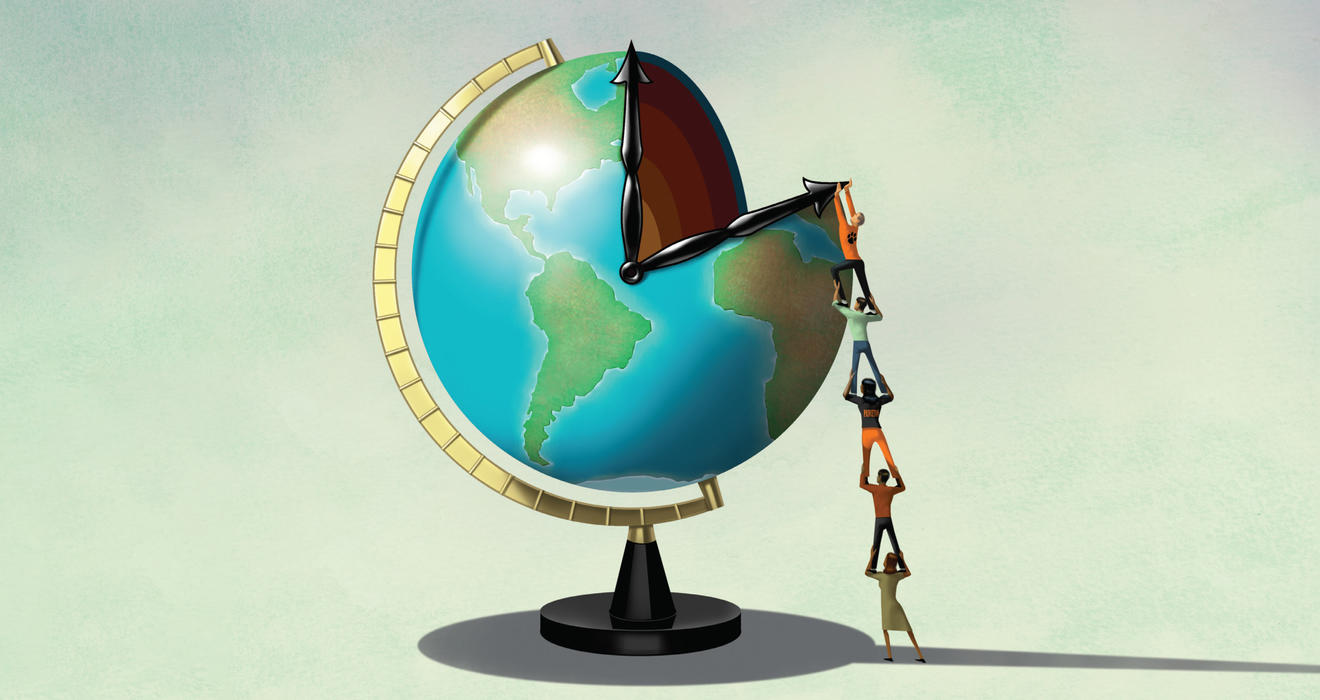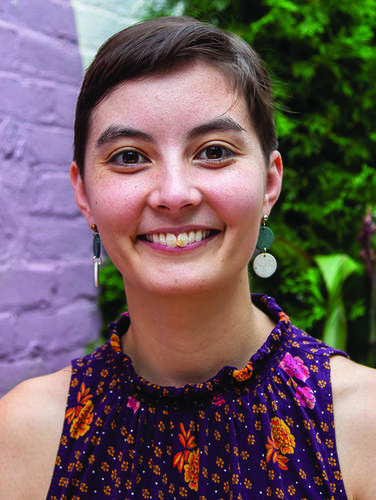
Call It Climate Challenge
Some of the smartest, most dedicated people in the world are trying to tackle the warming planet
Inevitably, when I tell people I work as a climate reporter, they say, “That must be so depressing.”
It can certainly seem that way. After all, the most common story told about climate change over the past 40 years has gone something like this: Greenhouse gas emissions are rising. Droughts, heat waves, species extinctions, and deluges are around the corner. We are missing our opportunities to act.
This story compelled me when I first came to Princeton in 2013. Initially attuned to space, science fiction, and STEM, I had set my sights on studying astrophysics. But in my first semester or two I was taken with the University’s unofficial motto — then “in the nation’s service and in the service of all nations” — and felt a sense of responsibility to do something about what I saw as the greatest issue of our time.
So I threw myself into the study of climate change. With the help of a few supportive professors, I managed to get approval for an independent major that focused almost entirely on global warming and the environment. (Princeton didn’t then — and still doesn’t now! — have a major in environmental studies or environmental sciences.)
As I learned about renewable energy and paleoclimates and carbon taxes, I began to feel that the common climate story was wrong. Yes, climate change is a slowly unfolding disaster, one that we have waited far too long to solve. But it is also an opportunity: A chance to turn an economy grounded in burning fossil fuels into one based on cleaner sources of energy — sources that don’t give children asthma or the elderly heart disease. A chance to reassess the inequalities between countries in the north and south, between rich and poor.
Slowly, I grew interested in new kinds of stories about the climate crisis, stories that didn’t hit the same “disaster” notes over and over. I began to write about climate solutions and the people trying to implement them.
Now, as a journalist at The Washington Post, I try to convince readers that, while climate change may be depressing, it is also one of the most interesting problems in the world. It requires creative scientific and engineering breakthroughs — everything from the development of low-carbon cement and ever-larger lithium-ion batteries to the study of how researchers can coax the oceans to absorb more carbon dioxide. It is a problem that, by its very definition, will require the entire world to solve — from diplomats to electricians to corporate sustainability officers to activists to novelists.
Princeton has been a part of this story. The University is trying to use its campus as a form of live-in lab, aiming for net-zero emissions by 2046 with the help of solar, wind, and ground-source heat pump technologies. It is establishing a new home for environmental studies and environmental science on campus to knit together related subject areas. It is my hope that Princeton will eventually create a full department to give interested students an academic track on campus.
Until recently, however, the University’s actions in these areas were often overshadowed by the approximately $1.7 billion invested in fossil fuels. After diligent efforts by alumni and student activists, last year Princeton announced it would divest from publicly traded fossil-fuel companies and dissociate — or cut financial ties — with 90 companies involved in some of the dirtiest forms of fossil fuel extraction. (Student and alumni activists argue that these steps do not go far enough, and that the University should divest and refuse research funding from all fossil fuel companies.)
But Princeton’s true strength in the fight against climate is its alumni, researchers, and professors. In the course of my reporting, I’ve talked to Princetonians who are digging ice cores in the Arctic, tracking the effectiveness of climate protests around the world, and developing comprehensive climate models that have helped to pass landmark laws. In this magazine issue alone, there are Princetonians developing fusion, diving into the environmental humanities, and negotiating from the halls of the State Department.
All these energetic efforts can’t, of course, blot out the scale of the problem. In 1992, the year that the United Nations first met to discuss the problem of global warming, humans were emitting about 22 billion tons of carbon dioxide every year. Last year, we emitted close to 37 billion tons. Sixty percent of all greenhouse gas emissions ever produced by humanity were sent into the atmosphere in just the past 40 years or so. The most amibtious goal of limiting warming to 1.5 degrees Celsius — enshrined in the landmark 2015 Paris Agreement — is now virtually impossible to achieve.
At the same time, miraculous things are happening around the world. The United States has passed a gigantic, $370 billion climate bill; the European Union is preparing similar efforts in response. In the past decade, the cost of solar energy and lithium-ion batteries has plummeted, as public understanding and belief in climate change has grown. As Elizabeth Kolbert wrote recently in The New Yorker: “To say that amazing work is being done to combat climate change and to say that almost no progress has been made is not a contradiction; it’s a simple statement of fact.”
I can’t tell anyone else whether they should be depressed or not about climate change. But I do know that every day I wake up, go into the office, and call some of the smartest, most dedicated people in the world — who are trying to tackle the warming planet in any way they can. Many of them are represented in these pages. I hope they inspire you, too.








8 Responses
Jenny Price ’85
2 Years AgoOn the Need to Think Big
I read the climate issue with great interest — but I’m now reading the letters (June 2023), from alumni who believe that the solutions to the terrifying global climate crisis are to focus on individual choices, retrofit your house, replace a zillion cars with a zillion EVs, buy carbon offsets, triple down on nuclear power, continue to rely on fossil fuels, and deny that the crisis is happening at all.
All of which don't even begin to acknowledge the huge, systemic transformations that this challenge demands — to entirely rethink our toxic industrial practices and growth-obsessed consumer economy, which are the root causes of the climate crisis … and also the plastics crisis, the groundwater crisis, and the ongoing collapse of the ecosystems we depend on to live.
Did you really not receive a single letter that urged Princetonians to think big? — and that advocate for solutions that match the almost unimaginable magnitude of these crises?
I can only hope so, or I’d be hard put to find any hope at all.
Kiku Loomis ’86, Environment Chair for the Class of 1986
2 Years AgoPlanning a Princeton Alumni Climate Summit
I was delighted to see the Climate Issue (April) featuring so many impressive Princetonians working on diverse aspects of the climate crisis. Many of my classmates in the Great Class of 1986 are also deeply concerned about climate change and doing their part to solve it.
In that spirit, our class held a virtual Climate Summit featuring a dozen classmates who chose to devote their professional careers to a range of climate and environment solutions. The session attracted a large attendance but even with the breakout sessions it felt like we were barely scratching the surface of the interest.
We ended by agreeing that more such sessions were needed, so we plan to hold a second Climate Summit. This time, we wish to invite all classes to participate. Alumni interested in organizing, joining a panel, or simply attending should email me at pu86officers@gmail.com.
While each of us does what we can to take action in our domains, it is vital to come together and share solutions across a wide range of disciplines. By sharing our efforts across decades of Princeton alumni we have the unique opportunity to build a powerful force for good in a time when it is urgently needed, and together raise hope that we will indeed solve this crisis. Thanks to the PAW for your contribution to this cause.
John Huyler ’67, Lynne Archibald ’87, Hannah Reynolds ’22
2 Years AgoContinuing the Climate Conversation at Reunions
Kudos to the PAW for its Climate Issue (April 2023). All three of us are alumni who were profiled in the article on Divest Princeton (“The D Word,” April issue). Since the Climate Issue appeared we have been thrilled to see alumni writing to the Inbox about the climate challenge. This is precisely what we had hoped for: a robust exchange of opinions and knowledge, open to the entire University community.
Another opportunity for such an exchange will occur during Reunions at 11 a.m. on Friday, May 26, in McCosh 28. Two alumnae, Claire Kaufman *23 and Tina Eonemto Stege ’97, will join alumni Tom Taylor *21 and Tibita Kaneene ’03 on a panel moderated by Professor Rob Nixon. The topic is “Divest the Rest, We’re Not Done Yet.” We hope for attendance by reunion-goers of all stripes and persuasions. The session will be live-streamed on Facebook and then posted on the Divest Princeton website (www.divestprinceton.com).
Stephanie Turner *04
2 Years AgoQuestioning the Cover Image
I do not understand the image on the cover of The Climate Issue, April 2023. The actual Doomsday Clock is at a few minutes before midnight. The clock on the cover is already past 12, and people appear to be pushing the minute hand up to turn back time. It would make more sense to me if they were pulling that hand down on the other side, to prevent it from reaching midnight.
William R. Taylor ’80
2 Years AgoAnother Climate Innovator
I am in the process of enjoying the Climate Issue. A quick check finds no mention of biophysicist Brian von Herzen ’80 and his Climate Foundation, of which the main project is marine permaculture. His innovations will help seaweed farmers in the tropics most impacted by climate chaos, use seaweed to provide food, fuel, and fertilizer, and to sequester carbon when unharvested portions of the plants sink into the deep ocean where their carbon will remain for centuries. By growing on platforms further out to sea than seaweed usually grows, this will increase all these benefits. The seaweed also is at the base of a rich biodiverse ecosystem with all the benefits that provides. His upwelling of cold water using solar, wind, and tidal energy powered pumps will solve a modern problem of loss of natural upwelling which feeds the kelp ecosystem. In some cases it is advantageous to lower and raise the platforms of seaweed, which was used during a hurricane and saved enough of the seaweed to supply local seaweed farmers devastated by that storm, with nursery stock to replant their farms.
A visit to climatefoundation.org will get anyone interested started. The project needs support to scale up and make a significant contribution and has already obtained numerous grants. My wife and I interviewed Brian on our “A Farm and Garden Show” in February 2023 which can be heard here.
Please consider his great work for a future article.
William Miller ’66
2 Years AgoClimate Is a Political Issue
PAW’s April 2023 edition, The Climate Issue, ignored politics as a major factor blocking any solution to the climate issue. Other universities and the news media have seen and analyzed the political threat.
The University of Miami published a special report entitled “Politics of (Climate) Change,” in which Joseph Uscinski, a politics professor at Miami, said “in the case of climate change, because the scientific evidence is too plain for them to refute, the Republican Party has gone the route of conspiracy theory, claiming that the scientists must be corrupt, that climate change is a partisan plot.”
By attacking science with disinformation, Republican politics has stymied policies that can address negative impacts of climate change.
In 2021, The Financial Times published article entitled “How climate change became political” which said, “Whatever your perspective on climate change, it is likely to have been shaped by political culture and the media. For some, though, the subject is now so divisive that even the words ‘climate change’ are controversial. A study by the Yale Program on Climate Change Communication in the U.S. found that, in trying to encourage support for climate policies, switching to the phrase ‘extreme weather’ was more effective in winning over American conservatives.”
Republican politics has rejected even the use of the words “climate change.” Since the Kyoto Treaty in 1997, what had previously been solely a scientific issue became a political issue in by a wave of activity led by a group of companies and individuals in sectors such as oil and gas and coal to avoid restrictions on fossil-fuel consumption. The wave of activity shaped political opinions by investing in universities and think tanks and making political campaign donations. The group was good at what they do because of how sophisticated and elaborate their tools of influence became.
Unfortunately, PAW did not examine the threat from politics that is blocking a solution to climate change.
Ted Gutelius ’67
2 Years AgoDivestment and Fossil Fuel Availability
The April issue covered the global warming activities of alumni (“The D Word”). Neither this issue of PAW nor any of the previous issues on the same subject mention that 3 billion people who on average use less electricity than a refrigerator will continue to struggle if climate change proponents reduce the availability of fossil fuels. Their plight will be further aggravated by Princeton’s energy divestment policy. This policy will increase the cost of capital for energy companies — reducing research and development and increasing the cost of fuel for all, especially those 3 billion.
Linda Carroll ’71
2 Years AgoKudos on The Climate Issue
Kudos on The Climate Issue (April). It is both inspiring and comforting to learn of the leadership of Princeton alumni at the national and international levels who are finding solutions to the problem of climate change, shaping policy, and informing the public.
And I would ask you to feature an additional sector in a future issue: ways in which individuals can take responsibility in their own lives to reduce their contribution to these problems through the myriad choices that we all make. The only alumnus profiled whose effort fell into this category was Jonathan Safran Foer ’99, who focuses on the environmental effects of generating various foods. To this can be added transportation (available to most of us now and low-cost are public and active transportation), building temperature, energy source, and family size. Every alumnus and alumna can make environmentally friendly choices in most of these sectors and be active in our communities to promote greater awareness of the environment and choices that create healthier conditions for our planet and all of its species.